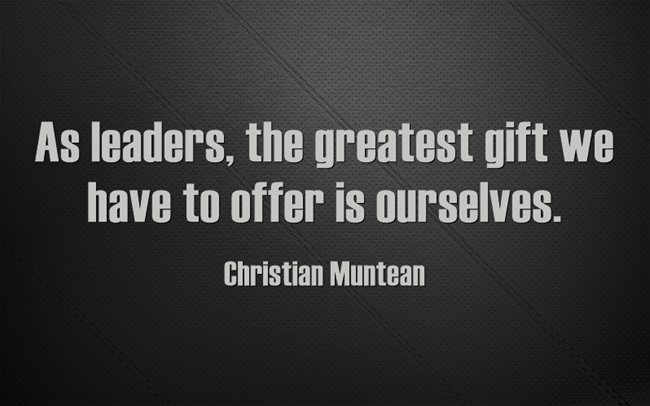Five Ways to Take the Mystery Out of Mentoring

My life has been blessed with many mentors. In high school my principal, Mr. Wangaard, took me under his wing, providing encouragement and coaching. A youth pastor, Carter Eby, did the same. There were many others.
I name them because it’s appropriate to give honor where honor is due. I’m 41 now. The same age, or maybe older, that they were when they worked with me. As I look back over my life, I clearly see how mentors played a dramatic role in shaping who I am as a man and as a leader. As I became older, fewer people sought me out to mentor me. However, I grew in my ability to seek out mentors and make the most of those relationships.
 As leaders the greatest gift we have to offer is ourselves.
As leaders the greatest gift we have to offer is ourselves.
We give our time, our thoughts, our encouragement and consideration as we challenge those we mentor. We may accomplish a lot through our leadership. However, we may accomplish even more through the relationships we build with others as we help them grow and succeed.
What is mentoring?
Some people complicate mentoring by making it something it’s not. For them, there’s a sense that a mentor needs to have a white beard, flawless wisdom, endless insight and unlimited time. This inaccurate picture may cause many great people to shy away from offering themselves as mentors because of their keen awareness of their limitations and flaws.
Mentoring is not complicated; it’s actually very simple. Mentoring is any relationship that has personal growth as its primary goal. That’s all. We don’t need to use the word “mentor” to mentor someone. In fact, it’s usually better if we don’t. All we need to do is open ourselves up to someone else for the purpose of his or her growth.
What do mentors do?
The best mentors:
- Ask good questions and listen effectively: The best mentors will, rather than offer answers, help the “mentee” find answers. When I mentor, I remember I don’t have to be the source of all wisdom or information. I focus, instead, on helping the person I’m working with find that information.
- Make themselves available: Effective mentors make themselves more available to a mentee; making time with that mentee a priority. Mentors provide personal contact information and they will usually respond very promptly. They also provide guidance regarding how and when to best access them.
- Help shape the relationship: Most mentees don’t know how to be mentored. The best mentors help them understand appropriate topics and how they fit within the relationship’s discussion time. Sometimes, mentors delineate all of this upfront; however, most just provide clear and gentle course-corrections as the relationship develops.
- Hold the mentee accountable: Unless the mentor is also the supervisor, accountability is usually of the “soft” variety. Mentors ask questions like, “I remember the last time we talked, and you mentioned you wanted to accomplish ________. How did that go?” Then, mentors celebrate successes or help explore which obstacles prevented success.
- Find the “good”: The very best mentors develop a bigger vision for the mentee than what the mentee can initially see. Good mentors help the mentee identify and value their strengths, their accomplishments and their abilities.
Now it’s your turn: Think of one person who might benefit from someone sharing the “good” they see in them. Would you be willing to make time today to tell that person “the good” and potential you see in them?
You might change their life.
Categories
Get Christian’s Newest Book: Train to Lead

Download my free 10-page eBook:
How To Accomplish More Without Doing More:
Eight Proven Strategies To Change Your Life
Discover how to save eight hours during your workweek-even if you're too busy to even think about it. The resource every maxed out executive needs.